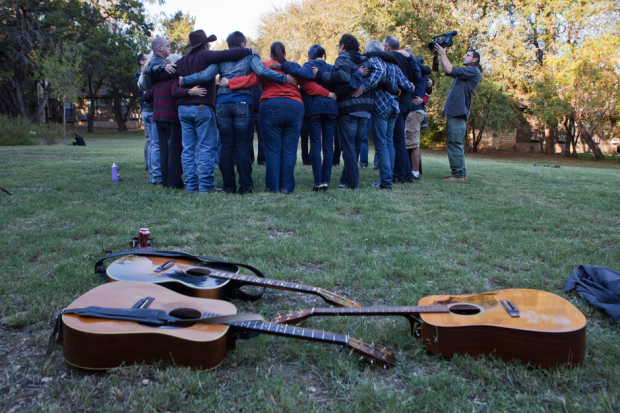On the final afternoon of the Songwriting With: Soldiers retreat, Smith, Foster, and Clementi perform and record all ten songs that have been written over the weekend for everyone assembled. Smith has plans to do four more retreats in 2013 and eight in 2014, and then put together an album of the best songs from all of them. That will require training more songwriters because, as Foster has pointed out, the retreat takes a heavy toll on its facilitators.
“I don’t think there’s any way, emotionally, you could do eight of these a year,” he says. “You can tell yourself, ‘I want to stand a little removed from it,’ and then every story sucks you in and twists you inside out. Because it’s so real and you see the excruciating pain in their lives. A couple of these a year is about all you can stand.”
Whether or not Smith is able to reach his goal of doing eight retreats a year remains to be seen. But in the greater scheme of things, all these programs — whether it’s Songwriting With: Soldiers, Bloom’s Musicorps, Dustin Welch’s songwriting workshops, Vaudreuil’s Resounding Joy, or several other similar ventures — will still only reach a small fraction of the service members who could benefit from them.
:audio=5:
With relations between the military and these programs still evolving, simply getting the word out to soldiers is a challenge. Funding, too, is scant and haphazard. Even the ones that operate at military facilities do so without any government funding. The Department of Defense did recently hire its first music therapist, who will work out of Walter Reed, but with the political mood in Washington being driven by talk of a “fiscal cliff” and the perpetual need for budget cuts, it’s hard to imagine any significant expansion of music therapy and songwriting workshops. But with the war in Iraq declared over and the war in Afghanistan winding down, the country is faced with reintegrating millions of service members back into society (or back into a peacetime military). And since many of those returning soldiers are suffering from unimaginable physical and psychological injuries, bumper stickers proclaiming support for the troops will not suffice.
No one at the retreat in Belton is under the delusion that songwriting or music therapy has the capacity to fix all these problems; but at least for the soldiers here, it’s making a difference.
After the final performances, Smith instructs everyone to walk outside to a clearing near the lodge and join arms in a circle. He, Foster, and Clementi stand inside the circle and play “Angel Flight.” It’s the kind of “Kumbayah” moment that you’d expect war-hardened soldiers to recoil from, but none do. After the song, some fight back tears and express what the weekend has meant to them — McRae says it’s made him realize that problems can be dealt with if you break them down and make them smaller; Hartman says it’s restored his faith in people’s basic decency. Then Smith delivers a few parting words and wishes them well. Everyone lingers in the clearing for a while, saying their goodbyes, but not particularly wanting to leave. Finally, McRae calls out, “I’m waiting for someone to yell, ‘Dismissed!'”
Smith laughs, and then complies.
“Dismissed!”
:audio=6:






